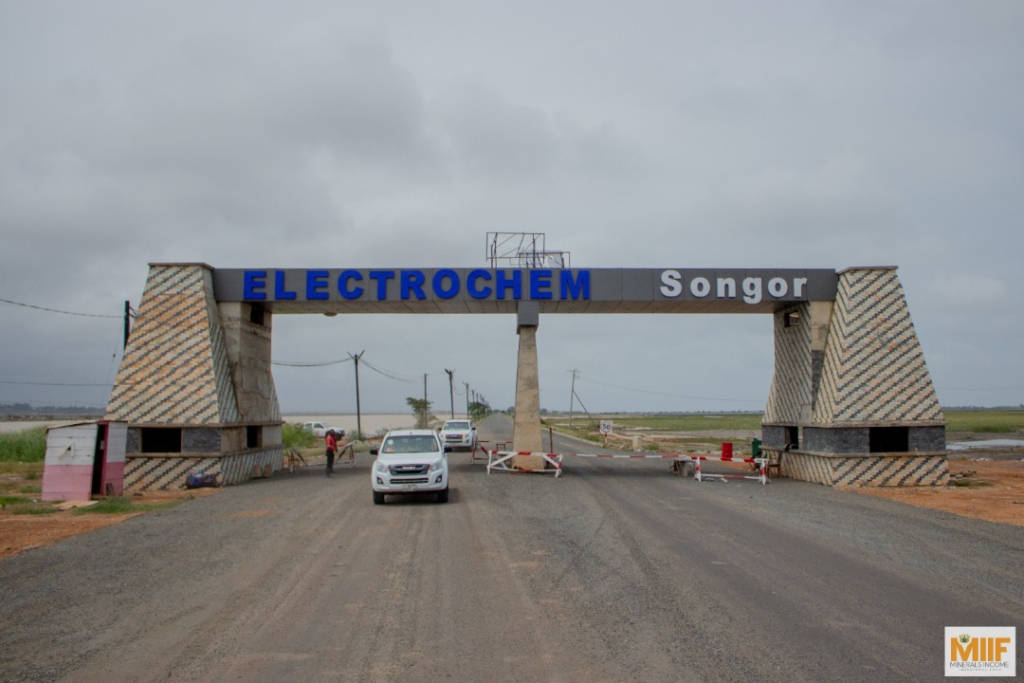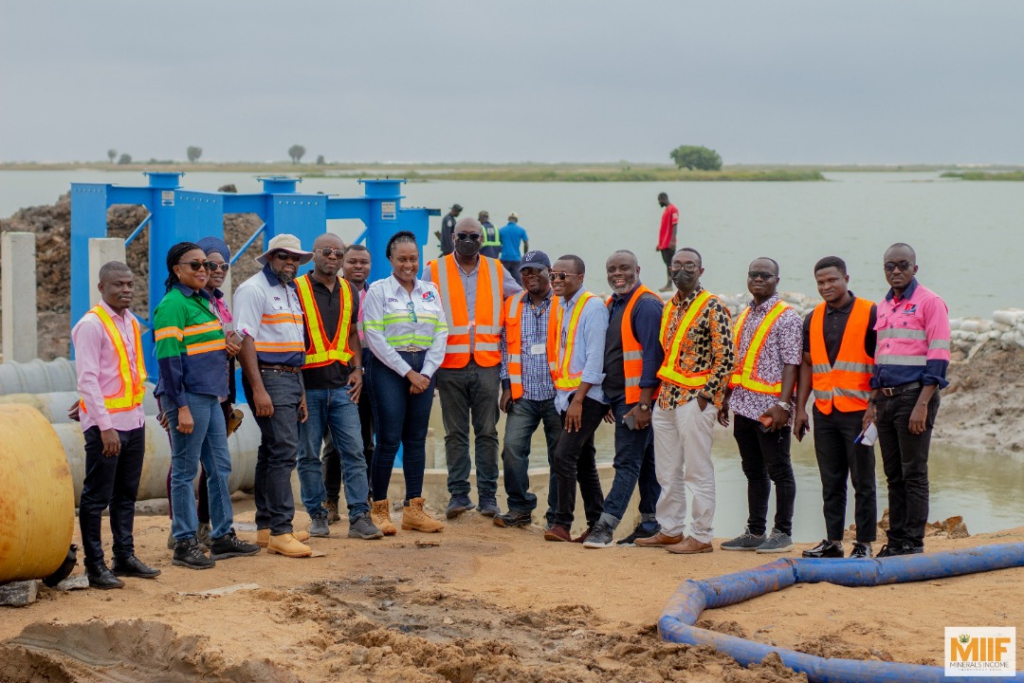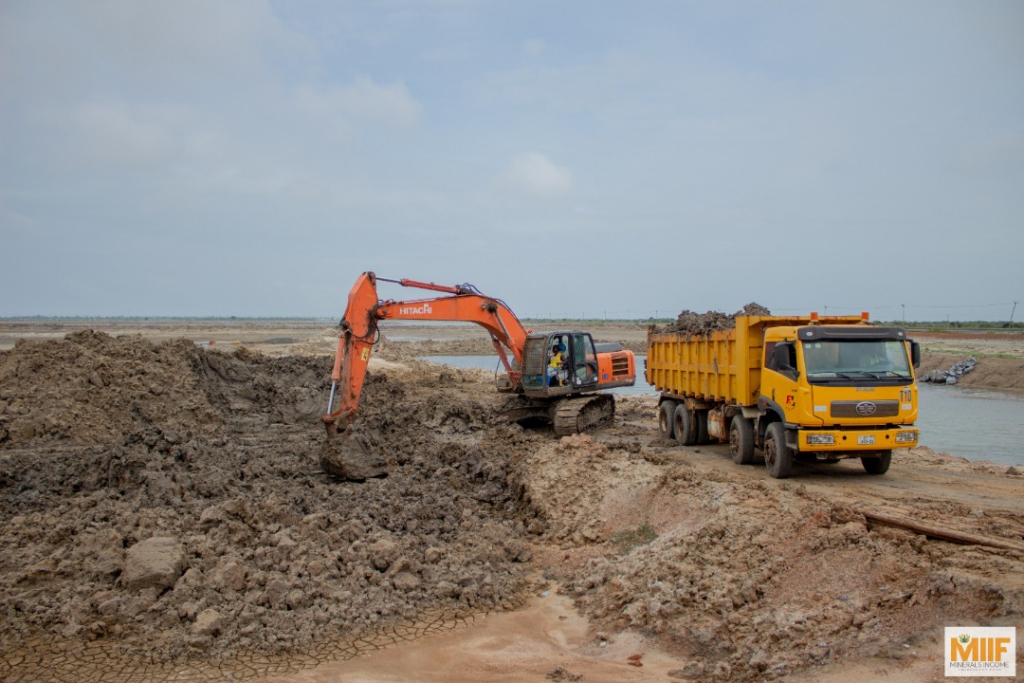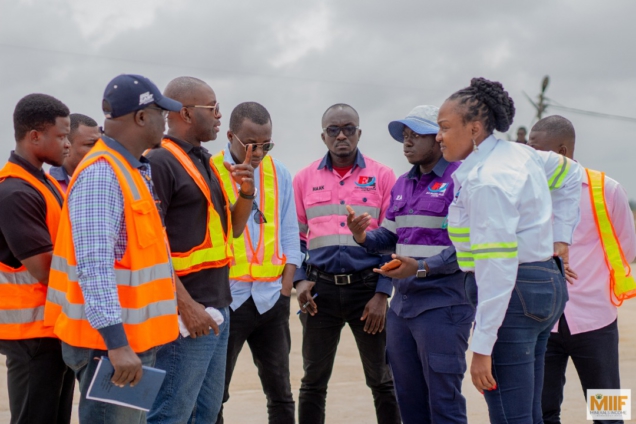The Minerals Income Investment Fund (MIIF) in line with its mineral investment diversification strategy is positioning to invest in the industrial salt sector. According to the Chief Executive Officer of MIIF, Mr Edward Nana Yaw Koranteng, salt is set to become one of Ghana’s major foreign exchange earners by 2026 and a top industrial earner by 2030 if the resuscitation plan of the Ada Songhor Salt project follows through as planned. This follows the plan of the Minerals Income Investment Fund (MIIF) to strategically focus on the sector. “The plan to boost salt production and the development of its allied value chain should yield about $2billion to the Ghanaian economy beginning 2027, with the potential to create more than 10,000 direct and indirect jobs in the next five years from just the Songhor Salt pans alone” Edward Nana Yaw Koranteng said after a one day working visit to the Ada.

Classification of Salt as ‘High Priority Mineral’ by MIIF
The Chief Executive Officer of MIIF, Edward Nana Yaw Koranteng is optimistic that the planned focus on the mineral will generate new economy vibrancy for the areas known for salt production such as Ada, Sege, Keta, Ningo and Winneba. Mr Koranteng intimated that, MIIF is developing a classification strategy for high priority minerals such as lithium, limestone, granite, diamond and salt. “Classifying Salt as a high priority mineral means we will invest in the mineral value chain development, we will de-risk it’s funding methods and help with the acquisition of relevant technology that revitalises the industry”. Mr Koranteng said, Ghana and Senegal are the only countries in West Africa with the potential for large-scale industrial production of salt. He decried the fact that Nigeria with a demand in excess of 1.5 million metric tons (MT) per annum, imports 80% of its industrial salt needs from Brazil while the Songhor salt pans alone has the capacity to produce over one million tons at just 60% capacity.

The Global Salt Market
Salt has at least 14,000 uses with the chemical industry most reliant on the mineral to produce various chemicals. It is frequently used as a raw material in the production of chlorine, caustic soda, and soda ash. Aside from these, industrial salt is used to make sodium sulphate, sodium carbonate, hydrochloric acid, sodium bicarbonate, liquid sodium, metallic sodium, chlorine, and sodium nitrate. Salt is also used for detergents, de-icing, textiles, fertilizers and is used heavily in oil and gas processing.
The worldwide market for salt was valued at circa $28.5 Billion in 2020 with 270 million metric tons (MT) of salt produced that year. The market is projected to grow to $36 Billion in 2026 with China controlling 22.48% of the world’s production. Africa’s leading salt producing countries are Egypt, Tunisia, Namibia, Morocco and South Africa. Egypt produced 1.75 million MT of salt while Tunisia produced 1.6 million MT of salt. The total amount of salt produced in Ghana has remained relatively flat since 2013 at about 250,000 MT.
The Ada Songhor Salt Resuscitation Project
The Ada Songhor Pans, a 41,000-acre salt project is currently being resuscitated by Electrochem, a fully owned Ghanaian company. The Ada Songhor Project in terms of acreage is the largest in Africa. It has been lying dormant as an industrial salt producing area since 1982 but has the potential to produce more than 1.75 million MT and to be the largest salt producing area in Africa. The resuscitation project by Electrochem which started in late 2016 with initial production starting in early 2021 has led to the full restoration of the Songhor lagoon which had dried out for eight years.
The resuscitation project which includes construction of evaporating and crystallisation ponds, extensive civil works, restoration of the lagoon, desilting and development of new pans has seen an initial investment of $58 Million dollars through a combination of debt and equity from a local bank and Electrochem. The current state has created employment for 2,800 people directly and indirectly, Electrochem has developed a community salt mining scheme for the local community with Electrochem itself as the offtaker. Although current production is just about 12% capacity now, the redevelopment has garnered interest from the sub-region region and led to the first ever sea export of salt from Ghana through the Tema ports.
The MIIF Initiative with Ada Songhor Salt
MIIF intends to partner and support the full restoration of the Ada Salt project to its full capacity with an equity investment. “The place was completely dead. The lagoon had dried up, the ponds were heavily silted and the project previously looked like a high risk or a death knell for any investor to engage especially with factions among the chiefs and people of the various communities. It was considered in financial circles as a poisoned chalice for anybody to take on”, Edward Nana Yaw Koranteng said of the state of the project before the new investors arrived.
Electrochem seem to have succeeded in reducing the daunting task into manageable pieces. Its chairman, Daniel McKorley told the MIIF team; “We realised the problem of factionalism the moment we conceived the project. We worked on uniting the community and seeking their support and that of the chiefs for more than two years before moving to site. We needed to get it right with the community. Among other things, we created a beneficial financial scheme especially for the women and assured the leaders that there would be several hundreds of jobs for the youth in the area over the sixteen-year lease. It was when we started the process of trying to prepare the ponds for production through desilting that we realised we had taken on an unbelievably huge project.” “We are creating a wealthy ecosystem that feeds the community first and then business. Remember, Salt production is primarily from the sea and as long as the sea never dries, the community and the business will both progress”, Daniel McKorley said.
“For us at MIIF, the fact that this project is wholly owned by Ghanaians and could integrate several parts of our development agenda such as the 1D1F where salt is used in virtually every industry excites us greatly. The focus for MIIF is to create value and derive even greater value to the community and to Ghana as a whole. We do this by building local participation into our mining model at the ownership level as well as developing the value chain to the benefit of Ghanaians. The Africa Continental Free Trade Area provides immense possibilities not only to Songhor but to a well-developed salt mining sector in Ghana. The Songhor salt project and the sponsors, Electrochem, tick the boxes for long term viability, environmental, social and governance, export potential, high salt density, infrastructure plans and the fact that all the engineers on site are Ghanaians. The corporate management suite is all Ghanaian and the project is supported by one of the best salt design and project managers in the world, Serra of Spain which is also responsible for the technical construction. This nexus of global experience and Ghanaian knowledge is what will make this project thrive and we believe with MIIF’s proposed investment, Ghana should be Africa’s largest salt producer by 2027” said Edward Nana Yaw Koranteng.
Mr Koranteng further emphasised that, in line with ongoing discussions with the Ghana Stock Exchange, there is a plan of development to list most of MIIF’s investments on the Stock Exchange. This has been included in the proposed Electrochem investment plan. This would allow a greater number of Ghanaians to own a part of the company”. Mr Koranteng concluded.
The Electrochem concession spreads through several communities including Sege, Ada Foah and Big Ada.
About the Minerals Income Investment Fund (MIIF)

MIIF is a sovereign minerals fund mandated by the Minerals Income Investment Fund Act 2018, (Act 978) as amended, to maximise the value of dividend and royalties income accruing to the Republic of Ghana in a beneficial, accountable and sustainable manner and to monetize Ghana’s mineral wealth in a manner which would bring long term value to Ghana.
MIIF also has 100% ownership of Agyapa Royalties Company, the only state-owned gold royalties company in Africa. MIIF has plans to list Agyapa on the London Stock Exchange and the Ghana Stock Exchange. MIIF has invested in the Toronto, Frankfurt and now Ghana listed Asante Gold Corporation which has just opened the lucrative Bibiani gold mine and is on the verge of acquiring the Kinross Chirano gold mine in Ghana. The acquisition will create one of the largest gold mining companies in West Africa. MIIF is also planning to invest in lithium and other upcoming gold projects.
Latest Stories
-
King Charles to resume public duties after progress in cancer treatment
57 seconds -
Arda Guler scores on first start in La Liga as Madrid beat Real Sociedad
11 mins -
Fatawu Issahaku’s Leicester City secures Premier League promotion after Leeds defeat
23 mins -
Anticipation builds as Junior Speller hosts nationwide auditions
54 mins -
Etse Sikanku: The driver’s mate conundrum
1 hour -
IMF Deputy Chief worried large chunk of Eurobonds is used to service debt
2 hours -
Otumfuo Osei Tutu II celebrates 25 years of peaceful rule on golden stool
2 hours -
We have enough funds to pay accruing benefits; we’ve never missed pension payments since 1991 – SSNIT
2 hours -
Let’s embrace shared vision and propel National Banking College – First Deputy Governor
3 hours -
Liverpool agree compensation deal with Feyenoord for Slot
3 hours -
Ejisu by-election: There’s no evidence of NPP engaging in vote-buying – Ahiagbah
3 hours -
Ejisu by-election: Independent ex-NPP MP’s campaign team warns party against dubious tactics
3 hours -
ZEN Petroleum supports Tse-Addo Future Leaders School
4 hours -
NPP must win back Adentan seat in 2024 polls – Obeng Fosu
4 hours -
PPA Clarification: The dark side of the World Bank’s ‘giveaways’ in Ghana by Bright Simons
5 hours

